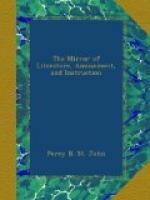In pursuance of these benevolent intentions, the lieutenant, as a preliminary step, first knocked down the suspected rebel from County Kildare, which the weight of mettle in his fist rendered no difficult achievement. His garters then did duty as handcuffs: and with the aid of a brawny aide-de-camp (one such always attended him), he pinioned his victim hand and foot, and then most considerately advised him to pray for King George, observing that any prayers for his own d—d popish soul would be only time lost, as his fate in every world (should there be even a thousand) was decided to all eternity for having imagined the death of so good a monarch.
During this exhortation, the lieutenant twisted up his long cravat so as to make a firm, handsome rope, and then expertly sliding it over the rebel’s neck, secured it there by a double knot, drew the cravat over his own shoulders, and the aide-de-camp holding up the rebel’s heels, till he felt him pretty easy, the lieutenant with a powerful chuck drew up the poor devil’s head as high as his own (cheek by jowl), and began to trot about with his burden like a jolting cart-horse,—the rebel choking and gulping meanwhile, until he had no further solicitude about sublunary affairs—when the lieutenant, giving him a parting chuck, just to make sure that his neck was broken, threw down his load—the personal assets about which the aide-de-camp made a present of to himself.
Now all this proceeding was very painstaking and ingenious: and yet the ungrateful government (as Secretary Cook assured me) would have been better pleased had the execution taken place on timber and with hemp, according to old formalities.
To be serious:—this story is scarcely credible—yet it is a notorious fact; and the lieutenant, a few nights afterwards, acquired the sobriquet which forms a head to this sketch and with which he was invested by the upper gallery of Crow Street Theatre—nor did he ever get rid of it to his dying-day.
The above trotting execution (which was humorously related to me by an eye-witness) took place in the barrack-yard at Kerry House, Stephen’s Green. The hangee was, I believe, (as it happened) in reality a rebel.




